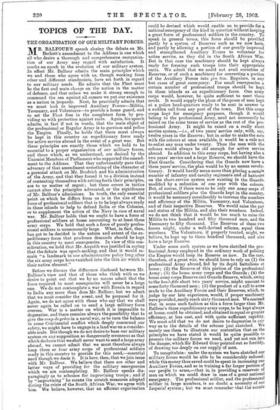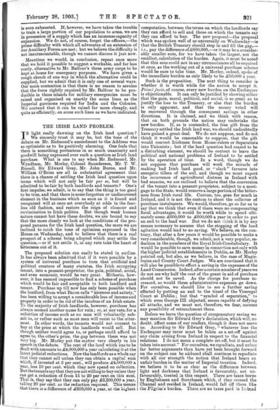TOPICS OF THE DAL
THE ORGANISATION OF OUR MILITARY FORCES.
MR. BALFOUR'S speech closing the debate on Mr. Beckett's amendment to the Address is one which all who desire a thorough and comprehensive reorganisa- tion of our Army may regard with satisfaction. It marks an epoch in the evolution of our military system. In effect Mr. Balfour admits the main principles which we and those who agree with us, though working from other and different standpoints, have set forth in regard to our military needs. He admits that the Fleet must be the first and main charge on the nation in the matter of .defence, and that unless we make it strong enough to command the sea against all comers we put our existence as a nation in jeopardy. Next, he practically admits that we must look to improved Auxiliary Forces—Militia, Yeomanry, and Volunteers—to provide a home guard, and to set the Fleet free in the completest form by pro- viding us with protection against raids. Again, his speech admits, in fact if not in words, that the main object of the professional or Regular Army is to garrison and police the Empire. Finally, he holds that there must always be kept in this country an expeditionary force ready for active service abroad in the event of a great war. But these. principles are exactly, those which we hold to be essential to a proper organisation of our military forces, and those which, as we understand, are desired by the Unionist Members of Parliament who supported the amend- ment to the Address. That they unfortunately gave their advocacy of that amendment something of the character of a personal attack on Mr. Brodrick and his administration of the Army, and that they forced it to a division instead of contenting themselves with setting forth their principles, are to us matter of regret ; but these errors in tactics cannot alter the principles advocated, or the significance of Mr. Balfour's admissions. In truth, the only essential 'point on which he differs from us is in the size of the force of professional soldiers that is to be kept always ready in .these islands to help to defend India or the Colonies, 'or to supplement the action of the Navy in case of naval war. Mr. Balfour holds that we ought to have a force of professional soldiers at home amounting to at least three army corps. We hold that such a force of purely profes- sional soldiers is unnecessarily large. What, in fact, then, has got to be decided is the nature and extent of the ex- peditionary force that prudence demands should be kept in this country to meet emergencies. In view of this con- sideration, we hold that Mr. Asquith was justified in. saying that the debate was epoch-making, and that it would re- main "a landmark in our administrative policy long after the six army corps have vanished into the thin air which is their native element."
Before we discuss the difference disclosed between Mr. Balfour's view and that of those who think with us we desire to point out that we by no means admit that the force required to meet emergencies will never be a large one. We do not contemplate a war with Russia in regard to India any more than does Mr. Balfour, but we admit that we must consider the event, and be prepared for it. Again, we do not agree with those who say that we shall never again be called on to send a large military force oversea. War is a matter on which it is impossible to dogmatise, and there remains always the possibility that to give the coup de grace in a naval war, or to turn the balance in some Continental conflict which deeply concerned our safety, we might have to engage in a land war on a consider- able scale. But though we do not desire to base our military system on any supposition so dangerously erroneous as that which declares that we shall never want to send a large army abroad, we cannot admit that we must therefore always keep three or four army corps of professional soldiers ready in this country to provide for this need,—essential need though we deem it. It is here, then, that we join issue with Mr. Balfour. We believe that there are other and better ways of providing for the military emergencies which we are contemplating. Mr. Balfour speaks dis- paragingly as to schemes for improvising troops ; and if by " improvising " he means the scratch measures adoptea during the crisis of the South African War, we agree with him. We believe, however, that an efficient organisation could be devised which would, enable us, to provide for a national emergency of the kind in question without keepihg a great force of professional soldiers in the country. To speak in general terms, this force should be provided partly by a system of Reserves such as we now hafe, and partly by allowina. a portion of our greatly improved and strengthened I.uxillary Forces to volunteer for active service, as they did in the South African War. But in that case the machinery should be kept always ready for forming such troops into their appropriate units. We admit that we could not avail ourselves of Reserves, or of such a machinery for converting a portion of the Auxiliary Forces into pro tern. Regulars, in any but cases of great emergency: For small emergencies a certain number of professional troops should be kept in these islands as an expeditionary force. One army corps would, however, be quite sufficient to meet these needs. It would supply the place of the posse of men kept at a police head-quarters ready to be sent in answer to a sudden call from any part of the town. But this army corps kept for emergency purposes, though it would belong to the professional Army, need not necessarily be raised on the same terms of service as the rest of the pro- fessional Army. It might be raised on a really short service system,—i.e., of two years' service only, with, say, twelve years in the Reserve ; but in order to make the men with the colours at once available, it would be a rule not to enlist any man under twenty. Thus the men with' the colours would always be old enough for active service abroad. In addition to this army corps, but having also a two years' service and a large Reserve, we should have the Foot Guards. Considering that the Guards now have a three years' service, the plan would be by no means revolu- tionary. It would hardly mean more than, placing a certain number of infantry and cavalry regiments and of batteries on the short-service system now existing in the Guards, modified by a reduction of one year with the colours. But, of course, if there were to be only one army corps of professional soldiers plus the Guards kept in the country, it would be necessary considerably to increase the numbers and efficiency of the Militia, Yeomanry, and Volunteers, and of their respective Reserves. We would raise the pay and status of the Militia, and also their numbers. Indeed, we do not think that it would be too much to raise the Militia to two hundred and fifty thousand men, and the Yeomanry to fifty thousand. The Reserves of these two forces might, under a well-devised scheme, equal these numbers. The Volunteers, if properly treated, might; we believe, be kept up to three hundred thousand, and also have a large Reserve.
Under some such system as we have sketched the pro- fessional Army employed in the ordinary work of policing the Empire would keep its Reserve as now. In the case, therefore, of a great war, we should have to rely. on (1) the professional Army abroad, fed by its depOt 'battalions at home ; (2) the Reserve of this portion of the professional Army ; (3) the home army corps and the Guards ; (4) the home army corps Reserve and Guards Reserve; which, owing to the bona-fide short two years' service, might amount to some forty thousand men ; (5) the product of a call to arms made to the Auxiliary Forces and their Reserves, which, to judge by our late experience, would, if proper machinery were provided, easily reach sixty thousand men. We contend that in some such fashion as this a force larger than Mr. Balfour's three expeditionary army corps, to be kept always at home, could be obtained; and obtained in equal or greater efficiency, at less cost, and with quite sufficient rapidity. We must add that we do not desire to dogmatise in any way as to the details of the scheme just sketched.. We merely use them to illustrate our contention that on the principles we have stated it would be quite possible to procure the military forces we need, and yet not run into the danger,.which Sir Edward Grey pointed out so 'forcibly, of drawing too deeply on our supply of men.
To recapitulate :.under the system we have sketched our military forces would be able to be considerably reduced; while the money thus saved could be spent in increasing our Auxiliary Forces, and so in training a fax larger portion of our people to arms,—that is, in providing a reservoir of men on which we could draw in case of a great national emergency. The professional soldier, and the professional soldier in large numbers, is no doubt a necessity of our Imperial system ; but we must remember that the supply is soon exhausted. If, however, we have taken the trouble to train a large portion of our population to arms, we are in possession of a supply which has an immense capacity of expansion. We do not, of course, forget the officers,—the prime difficulty with which all advocates of an extension of our ArYiliary Forces are met; but we believe the difficulty is not insurmountable, though we cannot discuss it just now.
Meantime we would, in conclusion, repeat once more that we hold it possible to suggest a workable, and far less costly. alternative to Mr. Balfour's three army corps to be kept at home for emergency purposes. We have given a rough sketch of one way in which the alternative could be supplied, but we admit that it is only one of several ways. Our main contention is that there is no reason to assume that the force rightly required by Mr. Balfour to be pro- ducible in these islands for military emergencies must be raised and organised on exactly the same lines as the Imperial garrisons required for India and the Colonies. We contend that it can be raised far more cheaply, and quite as efficiently, on some such lines as we have indicated.











































 Previous page
Previous page